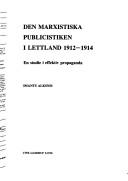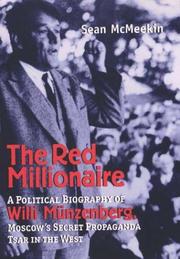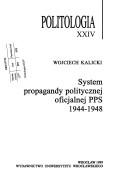| Listing 1 - 10 of 16 | << page >> |
Sort by
|
Book
ISBN: 091597908X Year: 1984 Publisher: Fairfax Hero Books
Abstract | Keywords | Export | Availability | Bookmark
 Loading...
Loading...Choose an application
- Reference Manager
- EndNote
- RefWorks (Direct export to RefWorks)
Political science --- -Propaganda, Communist --- -Communist propaganda --- Communism --- Propaganda, Anti-American --- Administration --- Civil government --- Commonwealth, The --- Government --- Political theory --- Political thought --- Politics --- Science, Political --- Social sciences --- State, The --- Dictionaries --- State, TheDictionaries --- -Dictionaries --- Propaganda, Communist --- Communist propaganda
Book
ISBN: 0903868679 Year: 1985 Publisher: London Overseas Publications Interchange
Abstract | Keywords | Export | Availability | Bookmark
 Loading...
Loading...Choose an application
- Reference Manager
- EndNote
- RefWorks (Direct export to RefWorks)
Political science --- Propaganda, Communist --- Russian language --- Dictionaries --- Russian. --- Dictionaries. --- Communist propaganda --- Communism --- Propaganda, Anti-American --- Administration --- Civil government --- Commonwealth, The --- Government --- Political theory --- Political thought --- Politics --- Science, Political --- Social sciences --- State, The --- Dictionaries&delete& --- Russian

ISBN: 9140048748 Year: 1983 Publisher: Lund Gleerup
Abstract | Keywords | Export | Availability | Bookmark
 Loading...
Loading...Choose an application
- Reference Manager
- EndNote
- RefWorks (Direct export to RefWorks)
Propaganda, Communist --- -Press, Communist --- -Communism --- -Bolshevism --- Communist movements --- Leninism --- Maoism --- Marxism --- Trotskyism --- Collectivism --- Totalitarianism --- Post-communism --- Socialism --- Village communities --- Communist press --- Journalism, Communist --- Communist propaganda --- Communism --- Propaganda, Anti-American --- History --- Press, Communist --- History. --- -History --- Bolshevism

ISBN: 1281722197 9786611722197 0300130090 9780300130096 9781281722195 0300098472 Year: 2003 Publisher: New Haven Yale University Press
Abstract | Keywords | Export | Availability | Bookmark
 Loading...
Loading...Choose an application
- Reference Manager
- EndNote
- RefWorks (Direct export to RefWorks)
Willy Münzenberg-an Old Bolshevik who was also a self-promoting tycoon-became one of the most influential Communist operatives in Europe between the World Wars. He created a variety of front groups that recruited well-known political and cultural figures to work on behalf of the Soviet Union and its causes, and he ran an international media empire that churned out enormous amounts of propaganda and raised money for Communist concerns. Sean McMeekin tells Münzenberg's extraordinary story, arguing persuasively that his financial chicanery and cynical propaganda efforts weakened the non-Communist left, enraged the right, and helped feed a cycle that culminated in Nazism.Drawing extensively on recently opened Moscow archives, McMeekin describes how Münzenberg parlayed his friendship with Lenin into a personal fortune and how Münzenberg's mysterious financial manipulations outraged Social Democrats and lent rhetorical ammunition to the Nazis. His book sheds new light on Comintern finances, propaganda strategy, the use of front organizations to infiltrate non-Communist circles, and the breakdown of democracy in the Weimar Republic. It is also an engrossing tale of a Communist con man whose name once aroused fear, loathing, and admiration around the world.
Communists --- Propaganda, Communist --- Communism --- Bolshevism --- Communist movements --- Leninism --- Maoism --- Marxism --- Trotskyism --- Collectivism --- Totalitarianism --- Post-communism --- Socialism --- Village communities --- Communist propaganda --- Propaganda, Anti-American --- History. --- History --- Münzenberg, Willi. --- Mi︠u︡ntsenberg, V. --- Myuntsenberugu, Wīrī --- Willi, M. --- Munzenberg, Willi.

ISSN: 08677409 ISBN: 8322918631 Year: 1999 Volume: 2120 XXIV Publisher: Wroclaw Wydawnictwo Uniwersytetu Wroclawskiego
Abstract | Keywords | Export | Availability | Bookmark
 Loading...
Loading...Choose an application
- Reference Manager
- EndNote
- RefWorks (Direct export to RefWorks)
Propaganda, Communist --- -Socialism --- -Marxism --- Social democracy --- Socialist movements --- Collectivism --- Anarchism --- Communism --- Critical theory --- Communist propaganda --- Propaganda, Anti-American --- History --- Polska Partia Socjalistyczna --- -P.P.S. --- Parti socialiste polonais --- Polish Socialist Party --- Polnische Sozialistische Partei --- PPS --- Polska Partia Socjalno-Demokratyczna Galicji i Śląska Cieszyńskiego --- -History --- Socialism --- P.P.S. --- History.
Multi
ISBN: 0748670912 1281089281 9786611089283 0748630732 9780748630738 9780748625239 0748625232 9780748625246 0748625240 6611089284 9780748670918 Year: 2007 Publisher: Edinburgh : Edinburgh University Press,
Abstract | Keywords | Export | Availability | Bookmark
 Loading...
Loading...Choose an application
- Reference Manager
- EndNote
- RefWorks (Direct export to RefWorks)
Published at a point when American filmmakers are deeply involved in the War on Terror, this authoritative and timely book offers the first comprehensive account of Hollywood's propaganda role during the defining ideological conflict of the twentieth century: the Cold War. In an analysis of films dating from America's first Red Scare in the wake of the 1917 Bolshevik Revolution to the collapse of the Berlin Wall in 1989, Tony Shaw examines the complex relationship between filmmakers, censors, politicians and government propagandists. Movies were at the centre of the Cold War's battle for hearts and minds. Hollywood's comedies, love stories, musicals, thrillers, documentaries and science fiction shockers - to list a few genres - played a critical dual role: on the one hand teaching millions of Americans why communism represented the greatest threat their country had ever faced, and on the other selling America's liberal-capitalist ideals across the globe. Drawing on declassified government documents, studio archives and filmmakers' private papers, Shaw reveals the different ways in which cinematic propaganda was produced, disseminated, and received by audiences during the Cold War. In the process, he blends subjects as diverse as women's fashions, McCarthyism, drug smuggling, Christianity, and American cultural diplomacy in India. His conclusions about Hollywood's versatility and power have a contemporary resonance which will interest anyone wishing to understand wartime propaganda today. Key features: * The first comprehensive account of Hollywood's role during the Cold War. * A new interrogation of the collaboration between filmmakers and government in the production of propaganda. * The use of primary documentation and new archival research make this book unique.
Cold War in motion pictures. --- Motion pictures --- Propaganda, Anti-communist --- Cinema --- Feature films --- Films --- Movies --- Moving-pictures --- Audio-visual materials --- Mass media --- Performing arts --- Anti-communist propaganda --- Anti-communist movements --- Propaganda, Capitalist --- History --- Political aspects --- History and criticism --- Film --- World history --- anno 1900-1999
Book
ISBN: 0631156399 Year: 1989 Publisher: Oxford Blackwell
Abstract | Keywords | Export | Availability | Bookmark
 Loading...
Loading...Choose an application
- Reference Manager
- EndNote
- RefWorks (Direct export to RefWorks)
Communication in politics --- -Persuasion (Psychology) --- Propaganda, Communist --- -Public opinion --- -947.098 --- 32.019.5 <47> --- Opinion, Public --- Perception, Public --- Popular opinion --- Public perception --- Public perceptions --- Judgment --- Social psychology --- Attitude (Psychology) --- Focus groups --- Reputation --- Communist propaganda --- Communism --- Propaganda, Anti-American --- Communication --- Conformity --- Influence (Psychology) --- Propaganda --- Psychology, Applied --- Political communication --- Political science --- Soviet Union --- -Soviet Union --- -Politics and government --- -Communication in politics --- Persuasion (Psychology) --- Public opinion --- Political scienceSoviet Union --- -Soviet Union -Politics and government --- Persuasion (Psychology). --- 947.098 --- Politics and government
Book
ISBN: 1613760566 9781613760567 9781558497368 1558497366 9781558499607 1558499601 Year: 2010 Publisher: Amherst : Baltimore, Md. : University of Massachusetts Press, Project MUSE,
Abstract | Keywords | Export | Availability | Bookmark
 Loading...
Loading...Choose an application
- Reference Manager
- EndNote
- RefWorks (Direct export to RefWorks)
Propaganda, Anti-communist. --- Propaganda, International. --- Politics and literature. --- Popular culture and literature --- Book industries and trade --- Publishers and publishing --- Cold War --- Press and propaganda --- World politics --- Propaganda and press --- Propaganda --- Journalism --- Book trade --- Cultural industries --- Manufacturing industries --- Book publishing --- Books --- Booksellers and bookselling --- Literature and popular culture --- Literature --- Literature and politics --- International propaganda --- International relations --- Anti-communist propaganda --- Anti-communist movements --- Propaganda, Capitalist --- History --- Political aspects. --- Social aspects. --- Objectivity --- Publishing --- Political aspects
Book
ISBN: 9780520280670 9780520280687 9780520958517 0520280679 0520280687 0520958519 1306565855 9781306565851 Year: 2014 Publisher: Berkeley, Calif. University of California Press
Abstract | Keywords | Export | Availability | Bookmark
 Loading...
Loading...Choose an application
- Reference Manager
- EndNote
- RefWorks (Direct export to RefWorks)
Film Criticism, the Cold War, and the Blacklist examines the long-term reception of several key American films released during the postwar period, focusing on the two main critical lenses used in the interpretation of these films: propaganda and allegory. Produced in response to the hearings held by the House Committee on Un-American Activities (HUAC) that resulted in the Hollywood blacklist, these films' ideological message and rhetorical effectiveness was often muddled by the inherent difficulties in dramatizing villains defined by their thoughts and belief systems rather than their actions. Whereas anti-Communist propaganda films offered explicit political exhortation, allegory was the preferred vehicle for veiled or hidden political comment in many police procedurals, historical films, Westerns, and science fiction films. Jeff Smith examines the way that particular heuristics, such as the mental availability of exemplars and the effects of framing, have encouraged critics to match filmic elements to contemporaneous historical events, persons, and policies. In charting the development of these particular readings, Film Criticism, the Cold War, and the Blacklist features case studies of many canonical Cold War titles, including The Red Menace, On the Waterfront, The Robe, High Noon, and Invasion of the Body Snatchers.
Film --- anno 1900-1999 --- United States --- Motion pictures --- Cold War in motion pictures. --- Communism and motion pictures --- Blacklisting of entertainers --- Political aspects --- History --- Entertainers --- Communism and moving-pictures --- Motion pictures and communism --- Blacklisting --- 20th century american culture. --- 20th century american history. --- allegory. --- american entertainment culture. --- american films. --- anti communist propaganda. --- cold war. --- communism. --- critical lens. --- entertainment blacklist. --- film and television. --- film criticism. --- film history. --- historical films. --- hollywood blacklist. --- hollywood. --- house committee on un american activities. --- huac. --- literary allegory. --- movie studies. --- police procedures. --- political. --- politics. --- postwar period. --- propaganda films. --- propaganda. --- science fiction films. --- villains. --- westerns. --- United States of America
Book
ISBN: 0773416994 9780773416994 9780773450745 0773450742 Year: 2008 Publisher: Lewiston, N.Y. Edwin Mellen Press
Abstract | Keywords | Export | Availability | Bookmark
 Loading...
Loading...Choose an application
- Reference Manager
- EndNote
- RefWorks (Direct export to RefWorks)
This work investigates the use of sport in the first two decades of the Cold War to resist Communism by strengthening the American Way of Life. Each of the Cold War's key players used athletics as a means of advancing political ideologies. The book also evaluates the gains and losses of minorities in this era.
Cold War -- Social aspects -- United States. --- National characteristics, American -- History -- 20th century. --- Political culture -- United States -- History -- 20th century. --- Propaganda, Anti-communist -- United States -- History -- 20th century. --- Sports -- Political aspects -- United States -- History -- 20th century. --- Sports -- Social aspects -- United States -- History -- 20th century. --- Sports and state -- United States -- History -- 20th century. --- United States -- Politics and government -- 1945-1989. --- United States -- Social conditions -- 1945-. --- Sports --- Sports and state --- Cold War --- Propaganda, Anti-communist --- Political culture --- National characteristics, American --- Social Sciences --- Recreation & Sports --- Anti-communist propaganda --- Anti-communist movements --- Propaganda, Capitalist --- World politics --- Field sports --- Pastimes --- Recreations --- Recreation --- Athletics --- Games --- Outdoor life --- Physical education and training --- Sports policy --- State and sports --- History --- Political aspects --- Social aspects --- Government policy --- United States --- Politics and government --- Social conditions
| Listing 1 - 10 of 16 | << page >> |
Sort by
|

 Search
Search Feedback
Feedback About UniCat
About UniCat  Help
Help News
News